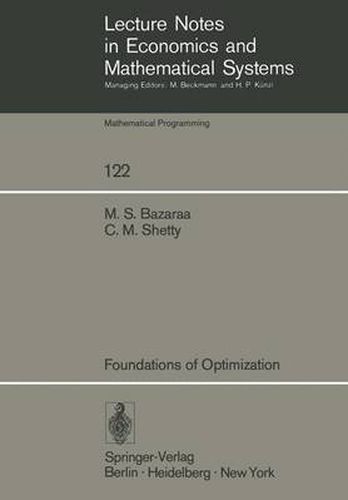Readings Newsletter
Become a Readings Member to make your shopping experience even easier.
Sign in or sign up for free!
You’re not far away from qualifying for FREE standard shipping within Australia
You’ve qualified for FREE standard shipping within Australia
The cart is loading…






This title is printed to order. This book may have been self-published. If so, we cannot guarantee the quality of the content. In the main most books will have gone through the editing process however some may not. We therefore suggest that you be aware of this before ordering this book. If in doubt check either the author or publisher’s details as we are unable to accept any returns unless they are faulty. Please contact us if you have any questions.
Current1y there is a vast amount of literature on nonlinear programming in finite dimensions. The pub1ications deal with convex analysis and severa1 aspects of optimization. On the conditions of optima1ity they deal mainly with generali- tions of known results to more general problems and also with less restrictive assumptions. There are also more general results dealing with duality. There are yet other important publications dealing with algorithmic deve10pment and their applications. This book is intended for researchers in nonlinear programming, and deals mainly with convex analysis, optimality conditions and duality in nonlinear programming. It consolidates the classic results in this area and some of the recent results. The book has been divided into two parts. The first part gives a very comp- hensive background material. Assuming a background of matrix algebra and a senior level course in Analysis, the first part on convex analysis is self-contained, and develops some important results needed for subsequent chapters. The second part deals with optimality conditions and duality. The results are developed using extensively the properties of cones discussed in the first part. This has faci- tated derivations of optimality conditions for equality and inequality constrained problems. Further, minimum-principle type conditions are derived under less restrictive assumptions. We also discuss constraint qualifications and treat some of the more general duality theory in nonlinear programming.
$9.00 standard shipping within Australia
FREE standard shipping within Australia for orders over $100.00
Express & International shipping calculated at checkout
This title is printed to order. This book may have been self-published. If so, we cannot guarantee the quality of the content. In the main most books will have gone through the editing process however some may not. We therefore suggest that you be aware of this before ordering this book. If in doubt check either the author or publisher’s details as we are unable to accept any returns unless they are faulty. Please contact us if you have any questions.
Current1y there is a vast amount of literature on nonlinear programming in finite dimensions. The pub1ications deal with convex analysis and severa1 aspects of optimization. On the conditions of optima1ity they deal mainly with generali- tions of known results to more general problems and also with less restrictive assumptions. There are also more general results dealing with duality. There are yet other important publications dealing with algorithmic deve10pment and their applications. This book is intended for researchers in nonlinear programming, and deals mainly with convex analysis, optimality conditions and duality in nonlinear programming. It consolidates the classic results in this area and some of the recent results. The book has been divided into two parts. The first part gives a very comp- hensive background material. Assuming a background of matrix algebra and a senior level course in Analysis, the first part on convex analysis is self-contained, and develops some important results needed for subsequent chapters. The second part deals with optimality conditions and duality. The results are developed using extensively the properties of cones discussed in the first part. This has faci- tated derivations of optimality conditions for equality and inequality constrained problems. Further, minimum-principle type conditions are derived under less restrictive assumptions. We also discuss constraint qualifications and treat some of the more general duality theory in nonlinear programming.